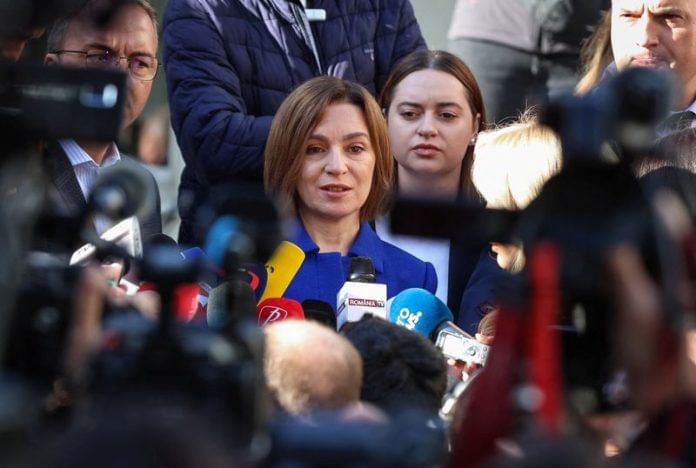By Dan Peleschuk
CHISINAU (Reuters) -Moldova’s pro-European ruling party won a resounding victory over its Russian-leaning rival in a key parliamentary election, results showed on Monday, a major boost for the country’s bid to join the EU and break away from Moscow’s orbit.
The surprisingly strong performance on Sunday by President Maia Sandu’s Party of Action and Solidarity (PAS) against the Patriotic Bloc was a relief for the government and its European partners, who accused Moscow of seeking to influence the vote.
With nearly all votes counted, PAS had won 50.2% versus 24.2% for the Patriotic Bloc, which had sought to steer Moldova – a small former Soviet republic wedged between Ukraine and EU member Romania – closer to Russia.
Some polls leading up to the election put PAS and Patriotic Bloc neck-and-neck with neither likely to get a majority. The near-final tally by Moldova’s electoral commission allows the government to push for its goal of EU membership by 2030.
STRONG SUPPORT FOR EU MEMBERSHIP
“The people of Moldova have spoken and their message is loud and clear,” Antonio Costa, president of the European Council which represents the EU’s 27 member states, said on X.
“They chose democracy, reform, and a European future, in the face of pressure and interference from Russia,” he added.
The leaders of France, Germany and Poland, in a joint statement, congratulated Moldova for the peaceful conduct of the election, despite unprecedented interference by Russia, including with vote-buying schemes and disinformation”.
Russia has denied meddling in Moldova’s election.
Ukrainian President Volodymyr Zelenskiy also hailed Sunday’s election result, saying Moscow had failed to “destabilise” Moldova.
First-time Moldovan voter Ana-Maria Orsu, 18, said she had noticed that many young people like her had turned out to cast their ballot.
“I think we have a bright future ahead of us,” she said in the centre of the capital Chisinau early on Monday.
PAS leaders had called Sunday’s election the most consequential since Moldova’s independence from the Soviet Union in 1991.
Sandu’s government said Russia had attempted to sway the vote through widespread disinformation and vote-buying.
Stanislav Secrieru, Sandu’s national security adviser, said election infrastructure and government websites had come under cyber attack, and that fake bomb threats were called in to polling stations in Moldova and abroad.
By contrast, Russia accused the pro-EU camp in Moldova of attempting to manipulate the outcome of the election.
Leonid Slutsky, head of the Committee on International Affairs in Russia’s parliament, said on Telegram there had been “violations of electoral rights and freedoms, large-scale purges of the political space, and blatant falsifications”.
“The Sandu regime is leading Moldova down the path of Ukraine.”
On Sunday, Patriotic Bloc co-leader Igor Dodon, a former Moldovan president, called for protests the next day in front of parliament, claiming that Sandu was planning to annul the vote. He did not provide evidence.
Authorities, which had also warned of Russian-backed attempts to stir unrest after the vote, will watch closely to see if Dodon follows through on the threat, and what crowds he can command if he does.
TUGGED EAST AND WEST
Moldova – with a population of 2.4 million people that has been buffeted by the war in neighbouring Ukraine, alleged Russian interference and energy shortages – has long vacillated between Russia and Europe.
The Patriotic Bloc and other opposition groups had sought to tap into voter anger over economic pain and the slow pace of reforms – grievances worsened by what officials say has been widespread disinformation.
Inflation remains stubbornly high at around 7%, while Moldovans also shoulder higher costs for imported energy.
Meeting the EU’s tough membership criteria will be very difficult for Moldova, one of Europe’s poorest countries.
Anastasia Pociumban of the German Council on Foreign Relations called Sunday’s election a vote of confidence in PAS and its EU plans but said the party faced a big challenge in “bridging the divides” in the country and better communicating the benefits of EU accession to more sceptical Moldovans.
(Reporting by Dan Peleschuk; Additional reporting by Alexander Tanas in Chisinau, Philip Blenkinsop in Brussels, Charlotte Van Campenhout in Amsterdam and Felix Light in Tbilisi, writing by Mike Collett-White, editing by Gareth Jones)
Disclaimer: This report is auto generated from the Reuters news service. ThePrint holds no responsibility for its content.






